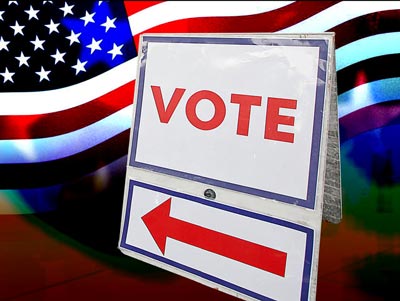Poll: Double digit support for hypothetical Independent Presidential candidates

Late last week, Public Policy Polling released the results of a survey gauging support for seven potential Independent candidates for President in 2012. Four out of the seven polled in the double digits, despite the fact that none has definitively stated an intention to seek the nation's highest office as an Independent.
The automated survey of 700 registered voters was conducted between August 18th and August 21st. The poll asked respondents how they would vote in seven different hypothetical scenarios pitting President Obama and Republican presidential hopeful Mitt Romney against an Independent candidate in a three-way contest. The survey measured support for New York City's Independent Mayor Michael Bloomberg, former Utah Governor Jon Huntsman, perennial presidential candidate Ralph Nader, former Alaska Governor Sarah Palin, Texas Congressman Ron Paul, Independent Senator Bernie Sanders and businessman Donald Trump. It is noteworthy that the survey did not include Rhode Island's Lincoln Chafee in its questionnaire. Chafee is the only sitting Independent governor in the nation.
The poll suggests that an Independent candidate for president would draw support away from the president's Republican challenger.
"Despite their grumbling, Democrats remain pretty united behind Obama, and six of the seven possible independent candidates would hurt Romney more than the president," writes Dustin Ingalls in an analysis of the results at the PPP blog.
Previous surveys have shown Romney polling competitively with the President in a head-to-head matchup. With an Independent in the mix, the President takes the lead by comfortable margins in all seven scenarios tested by PPP.
Four of the seven potential Independent candidates included in the survey polled in the double digits. Sarah Palin demonstrated the highest level of support as an Independent, garnering 21% support among all registered voters. 18% of respondents stated they would prefer Donald Trump in a three-way contest. 15% said they would cast their ballots for Ron Paul were he to run as an Independent. And 10% expressed support for Michael Bloomberg. Both Huntsman and Nader polled 7% support, with Bernie Sanders trailing at the bottom of the pack with 5%.
Among Independent voters, the numbers were slightly different. Independents were slightly more likely to support Obama, and more likely to express support for the Independent candidate than were all respondents in the general sample. The hypothetical Independent candidacy of Ron Paul came out on the top of the pack among registered Independents, garnering 20% support. Donald Trump received 17% among the unaffiliated in a three-way contest. Sarah Palin proved to be much less popular among Independents than in the general sample, with 15% support. 13% of Independents said they would vote for New York Mayor Michael Bloomberg. Huntsman, Nader and Sanders received 9%, 8% and 7% support, respectively, among Independents in the matchups tested by the survey.
It is also significant that three of the potential Independent candidates tested in the survey earned at least 15% support in the poll. The corporate Commission on Presidential Debates, which is controlled by the Democratic and Republican parties, requires that a third party or Independent candidate for the presidency must demonstrate at least 15% support across a number of polls in order to be included in any debates sponsored or produced by the Commission.
Furthermore, there is reason to suspect that the results of the PPP survey significantly underestimate the level of support for any of the Independent alternatives to Obama and Romney. A recent report at Talking Points Memo identified Public Policy Polling as "the "It" Democratic pollster." And, indeed, the organization's survey samples often skew strongly toward Democrats. This was the case in the current poll. Of the poll's 700 respondents, 41% were Democrats, 37% were Republicans and just 21% said they were Independents or "other." In a Pew Research survey released the same day as the PPP poll, 39% of respondents stated that they were Independents, compared with 29% who said they were Democrats and 26% who said they were Republicans.
Given that Independents are much more likely to consider supporting an Independent or third party candidate for President, and given that they were severely underrepresented in the PPP poll, it is possible that the PPP survey significantly underestimated support for an Independent alternative to the candidates of the Democratic and Republican parties.
Hopefully, other polling organizations will follow PPP's lead and begin gauging support for Independent and third party candidates ahead of next year's elections.




